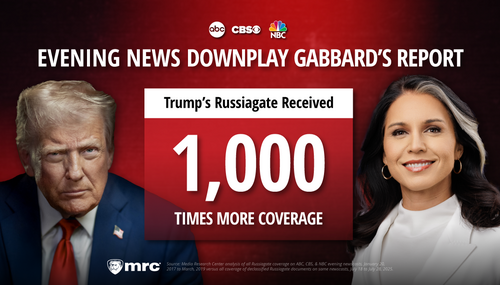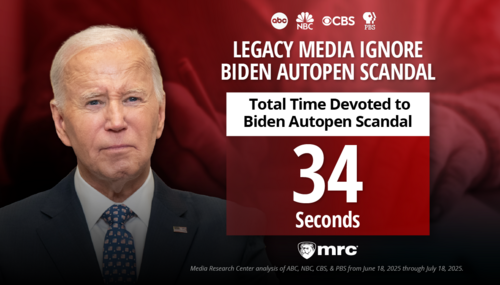If there's ever a "most pathetic correction ever" contest, the one posted by the Associated Press late Friday afternoon, conveniently ahead of what for many Americans will be a very long holiday weekend, has to be a serious contender. The wire service won't even acknowledge that it's a correction at its APnews.com site, instead calling it a "clarification." No one should be fooled.
The AP's folly appears to have been triggered by an appropriately labeled correction posted at the New York Times Thursday evening which, as Kristine Marsh at NewsBusters noted Friday morning, "admitted (that) one of the media’s major talking points about the (government's) Russia investigation wasn’t actually true."
Here's the Thursday correction at the Times, seen at Marsh's post:
A White House Memo article on Monday about President Trump’s deflections and denials about Russia referred incorrectly to the source of an intelligence assessment that said Russia orchestrated hacking attacks during last year’s presidential election. The assessment was made by four intelligence agencies — the Office of the Director of National Intelligence, the Central Intelligence Agency, the Federal Bureau of Investigation and the National Security Agency. The assessment was not approved by all 17 organizations in the American intelligence community.
The AP's Friday afternoon "clarification" was so weak, one has to ask why it even bothered (The APNews.com entry seen below only said that the item went up "yesterday"; the specific time stamp seen below was found at the identical item at the AP's main national site, where the "clarification" is nonetheless included in its current list of "corrections"):
So we have three agencies which "collected information" (AP apparently didn't consider the Office of the Director of National Intelligence to be an "agency," though the Times did). The three agencies the AP named are identified as the authors of the January 6 report, "Russia’s Influence Campaign Targeting the 2016 US Presidential Election."
Regardless of how many other agencies might have reviewed some or all of the "collected information," no others put their names on the report, meaning that no other agencies have been shown to have been "involved in reaching the assessment," which is clearly a separate step from reviewing "collected information." Thus, the default presumption has to be that only three three agencies actually reached the assessment.
The correction at the New York Times accurately notes that "The assessment was not approved by all 17 organizations in the American intelligence community." The AP's "clarification" about who was "involved" is more vague, and thus much weaker.
The actual "Russia's Influence" report's opening contradicts AP's contention that Russia's efforts were intended "to benefit Trump":
We assess with high confidence that Russian President Vladimir Putin ordered an influence campaign in 2016 aimed at the US presidential election, the consistent goals of which were to undermine public faith in the US democratic process, denigrate Secretary Clinton, and harm her electability and potential presidency. We further assess Putin and the Russian Government developed a clear preference for President-elect Trump. When it appeared to Moscow that Secretary Clinton was likely to win the election, the Russian influence campaign then focused on undermining her expected presidency.
In other words, if we are to believe the intelligence agencies' actual words and not the AP's convenient interpretation of them, the alleged efforts by Russia and Putin were all about hurting Mrs. Clinton, because they expected her to win the election. They had "a clear preference" for Trump, but that preference was not behind their alleged efforts. They would have had a clear preference for any candidate not named Hillary Clinton, who they assumed would be the next U.S. president.
Further, the report, contrary to the language AP employed without quote marks, doesn't directly mention "benefiting" Trump. No form of the word "benefit" appears in the report. A review of the 17 times Trump's name is mentioned includes contentions that Russia and Putin "aspired to help President-elect Trump’s election chances," apparently in the name of weakening Mrs. Clinton's perceived mandate if elected, but never claims that Russia and Putin believed that Trump could actually win.
It's prohibitively unlikely that AP's pathetically weak "correction" or "clarification" will ever filter through to all online postings of the four dispatches it identified, or to the public library newspaper databases like Proquest containing them.
To cite just two easily found examples, late Saturday evening, the sentence AP "corrected" or "clarified" in its April 6 story — "All 17 intelligence agencies have agreed that Russia was behind the hack of Democratic email systems and tried to influence the 2016 election to benefit Trump" — was still present at the websites of DC radio station WTOP and the Los Angeles Daily News. Additionally, a search at Proquest found four instances of the April 6 story which still contained — and likely always will contain — that sentence.
The AP's own cleanup isn't even complete.
The very day the wire service issued its "correction" or "clarification," Ken Thomas and Vivian Salama repeated the error, which remains even after an early Saturday update (APnews.com version is here):
That article, complete with the "17 agencies" error, has already made it to Proquest.
Cross-posted at BizzyBlog.com.





